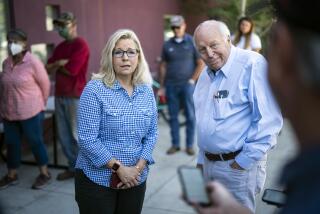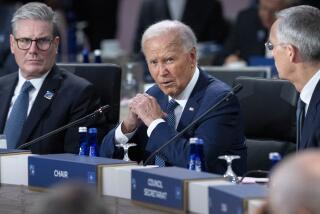For Cheney, Job as No. 2 Man Is ‘Energetic,’ Not Stressful
- Share via
WASHINGTON — Is it time for Vice President Dick Cheney to lighten his workload? Not if you listen to Dick Cheney.
“I’ve been living this way for 25 years,” he told an aide this week after he underwent a procedure to reopen a narrowed artery. “I’ve been dealing with this for decades.”
Despite chronic heart disease and four heart attacks, Cheney says he has no desire to slow down.
“He was dismissive” about the idea, said Mary Matalin, the aide who raised it with him.
Doctors warn that on-the-job stress can make a heart condition worse, but the vice president doesn’t think his job is all that stressful, Matalin added.
“I’ll tell you what Mrs. Cheney says: Stress is when you’re doing something that’s unfulfilling to you. That’s what they both think,” Matalin said. “He loves his job. It’s energetic, not stressful, to do the work that he does.”
Cheney left George Washington University Medical Center on Tuesday, one day after surgeons threaded a catheter into an artery near his heart and inflated a tiny balloon to open it up.
His doctors said there was a 40% chance that the narrowing problem could recur, but they added that there is “a very high probability” that he can complete his four-year term.
The vice president did not use a wheelchair, but walked to his limousine and headed to his official residence for an afternoon of rest--but not bed rest. Matalin said he spent most of the day “unpacking boxes and talking on the phone.”
Aides said Cheney may return to work in the White House as early as today.
President Bush told reporters that he doesn’t think Cheney should cut back on his workload, either.
“He shouldn’t . . . because he’s needed,” Bush said during a visit to Chicago. “This country needs his wisdom and judgment.
“He’s the kind of man who listens carefully to his body, and he is not going to put himself in a position where he gets very sick. Any time there’s any doubt as to whether or not he needs to see a doctor, he’ll see a doctor. And he’s plenty strong and plenty capable of carrying the workload that he’s been working in the past.”
Other White House aides said they would defer to Cheney’s judgment on the workload he wants to shoulder.
Cheney, 60, is already one of the most powerful vice presidents in modern history. A former White House chief of staff and a secretary of Defense, he ran the new administration’s transition operation and was a major voice in the selection of Cabinet members.
He has a far-reaching portfolio that includes serving as Bush’s point person on Capitol Hill, heading up an administration task force to look into the nation’s energy problems, making frequent television appearances as a key spokesman for the administration, and playing a crucial role in foreign policy matters.
Matalin said that Cheney is “pacing himself” and that he has shown no sign of stress in the job.
She said the vice president arrives at work about 7 a.m. and tries to leave between 6 and 7 p.m., a schedule typical for much of official Washington. Cheney and his wife, Lynne, often attend political or social events in the evening, as well.
On Sunday, even after he felt chest pains from his narrowed artery, Cheney appeared on NBC’s “Meet the Press” and then attended a birthday party for Federal Reserve Chairman Alan Greenspan.
“There’s no hours to cut back on,” Matalin said. “For him, it’s a normal day.”
Since his fourth heart attack in November, she noted, Cheney has gone on a diet, started an exercise program and lost weight.
“He’s in better health now than he was before he was vice president,” she said. “He eats nothing but salads; he’s basically Mr. Granola.”
She said Cheney exercises on a treadmill and other equipment at his official residence for a half-hour, three or four times a week.
The problem that landed Cheney in the hospital this week was much less serious than a heart attack. But it was a reminder that his chronic heart disease has not gone away.
Cheney’s pain was an aftereffect of his fourth heart attack in November, which physicians treated by inserting a stent--a scaffolding-like device--to hold open a blocked artery. On Monday, doctors discovered that scar tissue resulting from the earlier procedure had partly clogged a small portion of the stent.
Doctors performed a balloon angioplasty to reopen it.
Cheney had his first heart attack in 1978, at age 37. That prompted him to give up a three-pack-a-day smoking habit.
He had a second attack in 1984 and a third in 1988, both described as mild. He underwent quadruple bypass surgery in 1988 because of blocked arteries.
Medical studies have shown that stress has several negative effects on the heart that could increase the risk of repeat heart attacks.
But several experts said that if Cheney enjoys his work--and follows his doctors’ recommendations on exercise, diet and medicine--quitting his job could prove more dangerous than staying.
“It’s important to remember that one person’s stress may be another person’s piece of cake,” said Dr. Douglas Zipes, incoming president of the American College of Cardiology. “We may see the role of vice president as stressful, but to him it may be invigorating--and to have to step down might be more stressful for him than staying the course.”
If a vice president resigns or dies while in office, the 25th Amendment on succession would take effect. The president would nominate a candidate, and the House and Senate would need to confirm, by majority votes.
Stress in the form of an emotionally upsetting event or trauma, such as the loss of a spouse or job, an unwilling move or an accident, can increase the risk of sudden death from a heart attack, according to experts.
“There certainly is data to support the notion that emotional factors can have that kind of influence,” said Dr. Peter Kaufmann, leader of the behavioral medicine research group at the National Heart, Lung and Blood Institute.
However, he added, “it’s important to distinguish between what the research tells us generally--and the individual patient. There are many people . . . who take pleasure and pride in their work--however stressful. They thrive in those circumstances. Their entire reason for being is to deal with everyday challenges--it gives them a boost.”
Zipes said Cheney is likely “doing exactly what he’s been told to do,” regarding exercise, diet and medications.
“I would also add that he should try to manage his day as best he can in a stress-free way: no all-nighters, get eight hours of sleep, eat at regular hours, don’t skip meals, and pace himself.”
This should not be difficult in this administration. Bush has expressed his feeling that his top aides should be able to finish their tasks during a normal workday without having to put in excessive hours.
*
Times staff writer James Gerstenzang contributed to this story.
More to Read
Get the L.A. Times Politics newsletter
Deeply reported insights into legislation, politics and policy from Sacramento, Washington and beyond. In your inbox twice per week.
You may occasionally receive promotional content from the Los Angeles Times.











